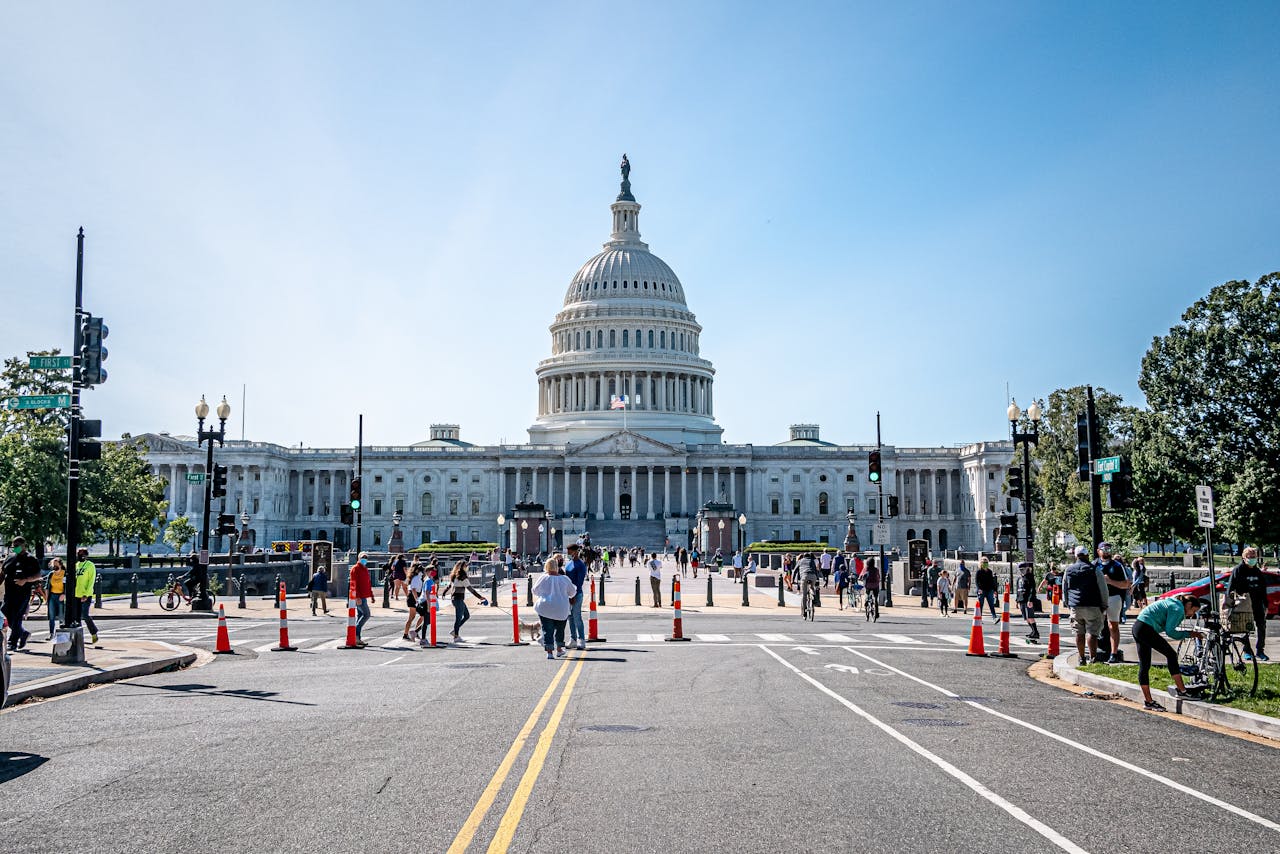Featured Blogs

We know many readers may still be working through Thanksgiving leftovers, but this week, Congress is serving up nothing but lame duck. However, this meal could turn into a food fight real fast, with Congress running out of time to make decisions about government funding, the Farm Bill, and the National Defense Authorization Act. So, let’s get into it. Welcome to the Week Ahead!
The Administration
The Biden administration proposed its Contract Year 2026 Medicare Advantage and Part D rule on November 26. This rule is one of the last major ways the Biden administration can leave its mark on the MA and Part D programs, and they didn’t hold back. The rule proposes allowing Part D plans to cover anti-obesity medications in cases where the beneficiary does not have another health condition beyond obesity or being overweight. Under the new proposal, plans would be able to cover these drugs for beneficiaries who are obese but not those who are overweight. Additionally, Medicaid plans would be prohibited from excluding anti-obesity drugs if used to treat obesity. The rule also includes proposals to strengthen prior authorization and utilization management guardrails under the MA program. The rule, if finalized, would also codify previously issued guidance about implementing the provision of the Inflation Reduction Act that will allow Part D beneficiaries to spread out their out-of-pocket costs monthly instead of paying all at once.
But here is the kicker: it will be up to the Trump administration to finalize the rule, so what can we expect from the incoming administration on this proposed rule? Well, we know that President-Elect Trump’s nominees to head Health and Human Services (RFK Jr) and the Centers for Medicare and Medicaid Services Administration (Dr. Oz) don’t see eye to eye on anti-obesity medication.
RFK Jr. has criticized these drugs, but Dr. Oz has expressed support for them. We also know Dr. Oz has been a strong supporter of MA, so if he is confirmed, MA plans may have a more friendly voice within the administration.
As far as how the Trump administration will handle the implementation of the IRA, it’s about as clear as Thanksgiving gravy! Congressional Republicans have criticized the Medicare price negotiations as price controls. However, President-Elect Trump did pursue several proposals to reduce drug prices. Combine that with the unconventional pick of Dr. Oz to run CMS, and you’ve got a recipe for a potential surprise.
The Senate
The Senate Democratic Caucus will hold its leadership elections for the 119th Congress on December 3. The most hotly contested race will be between Senator Amy Klobuchar (D-MN) and Senator Corey Booker (D-NJ) to take over leadership of the Democratic Policy and Communications Committee from retiring Senator Debbie Stabenow (D-MI).
In addition to the Senate Democratic leadership races, we will be watching for any news related to the makeup of key health care committees in the Senate, including the Senate Finance Committee, which has jurisdiction over Medicare and Medicaid.
Due to retirements and the results of the 2024 elections, 5 Democratic senators currently serving on the Senate Finance Committee will not be returning for the 119th Congress. Even though the Senate Democratic Conference will have fewer seats on that committee, there will still be a need to fill some of these vacancies. Senator Bernie Sanders (I-VT) made news on November 22 by announcing his desire to serve on the Senate Finance Committee, which would be in addition to his service as the ranking member of the Senate Committee on Health, Education, Labor, and Pensions (HELP) in the next Congress.
Other Democratic senators who have reportedly expressed interest in joining Senate Finance include Sens. Tina Smith (D-MN), Raphael Warnock (D-GA), and Corey Booker (D-NJ).
We predict the GOP will gain 2-3 seats on the Senate Finance Committee due to the revised committee ratios. No Republicans currently serving on the Senate Finance Committee are retiring or lost reelection.
We will also be watching to see if congressional appropriators will respond to the letter from Senator Ted Budd (R-NC) and other senators from states impacted by recent hurricanes, requesting approval of the Biden administration’s request for supplemental funding request for disaster relief.
Additionally, the Senate HELP Committee is holding a hearing on December 5 about what the Food and Drug Administration is doing to regulate the food and beverage industry in light of the diabetes and obesity epidemics in America.
The House
Since the House of Representatives is the starting point for appropriations bills, let’s check in on where things stand on that front. From what we are hearing, it sounds like the House will be teeing up a short-term (3-4 month) continuing resolution – delaying any funding decisions for FY 2025 until the new Congressional session.
We also expect this bill will not include anything related to health care beyond the health care extenders. Based on analysis from recent Congressional Budget Office scores, we estimate extending these health care policies for a few months will cost $2-3 billion. Only acting on health care extenders is bad news for advocacy groups, which have been urging Congress to include other policy changes in any year-end legislation. Physician groups have been hoping that Congress might address concerns about how doctors’ pay under Medicare is calculated, but that seems unlikely to happen.
Additionally, the House Oversight and Accountability Select Subcommittee on the Coronavirus Pandemic will be holding a markup of their final report on December 4.
There You Have It
We recently posted about unique Thanksgiving food on LinkedIn. We’d love to hear if any of these (or any others) made it on your table this year. Make it a great week!

The nomination of Dr. Mehmet Oz as the Centers for Medicare and Medicaid Services (CMS) Administrator under President Trump has sparked significant discussion regarding the potential direction of U.S. health care policies. Dr. Oz, a cardiothoracic surgeon and television personality, brings a unique blend of medical expertise and public visibility to this role. His previous advocacy for Medicare Advantage and reforms in pharmaceutical pricing suggest that his tenure could lead to substantial changes in how health care is delivered and financed in the United States.
Expanding Medicare Advantage
Dr. Oz has long been an advocate for Medicare Advantage, a privatized alternative to traditional Medicare. His support for this program stems from its popularity among seniors, cost-efficiency, and ability to offer comprehensive coverage through private insurers. During his 2022 Senate campaign, he proposed expanding Medicare Advantage as a model for broader health care reform, suggesting that it could become a framework for a “Medicare Advantage for All” system.
Under Dr. Oz’s leadership, CMS could take several steps to bolster Medicare Advantage:
- Increased Funding and Incentives: Dr. Oz could advocate for enhanced reimbursement rates for Medicare Advantage plans, which would incentivize more private insurers to participate.
- Simplified Enrollment Processes: Streamlining enrollment could make it easier for beneficiaries to transition from traditional Medicare to Medicare Advantage.
- Expansion of Benefits: Policies to encourage plans to offer more supplemental benefits, such as dental, vision, and wellness programs, could further increase the attractiveness of Medicare Advantage.
By focusing on these initiatives, Dr. Oz could position Medicare Advantage as a cornerstone of the U.S. health care system, potentially reshaping how senior health care is managed nationwide.
Addressing Drug Pricing Reforms
Another area where Dr. Oz’s influence could be significant is pharmaceutical pricing. He has expressed concerns about the high cost of prescription drugs and has indicated support for negotiating lower prices within Medicare. This stance aligns with broader efforts to address affordability and accessibility in the U.S. health care system.
As CMS Administrator, Dr. Oz might pursue the following strategies to influence drug pricing:
- Enhanced Negotiation Authority: He could push for expanded CMS authority to negotiate drug prices directly with pharmaceutical companies, particularly for high-cost medications covered under Medicare Part D.
- Promotion of Generic and Biosimilar Drugs: Encouraging the use of lower-cost alternatives to brand-name drugs could reduce spending across Medicare programs.
- Value-Based Pricing Models: Implementing payment models that link drug prices to their effectiveness could help align costs with patient outcomes.
These reforms could mark a shift toward greater federal involvement in regulating drug prices, a move likely to attract both support and scrutiny from stakeholders in the pharmaceutical industry.
Balancing Privatization with Public Health Priorities
Dr. Oz’s support for privatized health care solutions, such as Medicare Advantage, may spark concerns about potential reductions in traditional Medicare coverage or increased costs for beneficiaries. Striking a balance between promoting private-sector efficiencies and ensuring equitable access to health care will be a key challenge during his tenure.
Moreover, his focus on cost-saving measures must address broader public health needs. For instance, while expanding private Medicare plans could improve efficiency, it is crucial to ensure that vulnerable populations, including low-income seniors and those with chronic conditions, continue to receive adequate care.
Implications for Stakeholders
Dr. Oz’s appointment as CMS Administrator would have far-reaching implications for various stakeholders:
- Beneficiaries: Seniors enrolled in Medicare Advantage plans could see expanded benefits and reduced costs, but those in traditional Medicare might face challenges if funding shifts.
- Private Insurers: Companies offering Medicare Advantage plans stand to benefit from potential policy changes, including increased enrollment and higher reimbursement rates.
- Pharmaceutical Industry: Efforts to control drug prices could pressure manufacturers to lower costs or justify pricing through value-based frameworks.
Conclusion
Dr. Mehmet Oz’s potential leadership at CMS signals a shift toward privatization and market-driven reforms in U.S. health care. His focus on expanding Medicare Advantage and addressing drug pricing reflects his belief in leveraging private-sector solutions to improve care delivery and reduce costs. (Diazepam online) However, his policies will need to balance these goals with CMS’s broader mission to ensure that all Americans, particularly vulnerable populations, have access to high-quality, affordable health care.
As stakeholders prepare for potential changes, the health care landscape under Dr. Oz’s leadership is likely to be marked by innovation, controversy, and a reimagining of how federal health care programs operate. Whether these reforms will achieve the desired outcomes remains to be seen, but their impact on the health care system will undoubtedly be significant.

As the political landscape has shifted with the 2024 election, health care policies are among the most significant issues that could be upended when the new Trump administration takes control in January. Under President Joe Biden, the Department of Health and Human Services (HHS) finalized several health care rules, that from their perspective, expand access to care, reduce drug costs, and protect vulnerable populations. However, many of these regulations may be on the chopping block come January.
Here’s a closer look at three key Biden health care rules that could be changed with President Donald Trump’s return to office:
The Skilled Nursing Facility (SNF) Staffing Rule
One of the major, and most controversial, health care initiatives from the Biden administration was a push to improve staffing standards in SNFs. The Centers for Medicare and Medicaid Services (CMS) finalized a rule in April 2024 that raised minimum staffing requirements for nursing homes, The rule set higher minimum standards for direct-care staff—such as registered nurses (RNs), licensed practical nurses (LPNs), and nurse aides— including that nursing homes must provide a minimum of 3.5 hours of care per resident per day from certified nurse aides (CNAs), including 0.5 hours from a direct registered nurse (RN). The rule also requires SNFs to have an RN onsite 24 hours a day, seven days a week.
Nursing home associations argued that the increased staffing requirements would lead to higher operational costs and potentially force some facilities to close or reduce services.
With Trump’s returns to office, he may direct his administration to roll back or rescind this rule. Trump’s 1st administration was known pulling back rules that increases operational costs for health care facilities – and this rule fits that category.
Medicare Drug Pricing Negotiations
One of the signature achievements of the Biden administration was the passage of the Inflation Reduction Act (IRA), which included provisions to allow the federal government to negotiate the prices of certain prescription drugs under Medicare. The law empowered Medicare to negotiate prices for a limited set of high-cost drugs. Under the IRA, the government negotiated the price of the ten most expensive drugs to Medicare, and proposed to expand this list further. This policy was touted as a major step to curbing the out-of-control growth of prescription drug costs for America’s seniors and those with disabilities.
However, the incoming Trump administration likely views these reforms as a step too far, potentially undermining free-market principles in the pharmaceutical industry. Trump’s administration previously opposed similar drug pricing negotiations. HHS, under Trump, could push to dismantle the provisions of the IRA, either by defunding the program, limiting its scope, or repealing the law entirely.
ACA Coverage for Dreamers
One of the more controversial aspects of the Biden administration’s health care policies has been its expansion of coverage under the Affordable Care Act (ACA) to include undocumented immigrants brought to the U.S. as children, also known as “Dreamers.” The Biden administration opened up health insurance marketplaces to DACA (Deferred Action for Childhood Arrivals) recipients, allowing them to access subsidies and qualify for Medicaid in some states. The policy was designed to ensure that Dreamers, many of whom are essential workers, have access to affordable health care.
Even with a lot of support from immigrant advocates, this policy has been the subject of heated debate. Critics argue that it represents a costly expansion of government programs that could incentivize illegal immigration and further strain public health resources. The Trump administration will almost certainly reverse this policy, pushing to end ACA coverage for Dreamers and restoring stricter immigration-related requirements for health insurance. Given Trump’s stance on immigration during his first term, a rollback of health coverage access for undocumented immigrants would likely be a priority.
You can be sure we are closely tracking all the incoming policy decisions of the Trump Administration. With health care being one of the most important and personal issues to millions of Americans, the policies adopted in the coming years will continue to shape the future of health care in the U.S.

As President-Elect Trump builds out his forthcoming second administration, the changing colors of the leaves and cooler temperatures aren’t the only signs of change this autumn. Washington is still reeling from some surprising picks, such as former Rep. Matt Gaetz (R-FL-1) for Attorney General, Robert Kennedy Jr. for Secretary of Health and Human services, and Pete Hegseth for Secretary of Defense. But this Congress and administration aren’t done yet – there is still a lot to track in Washington. So, let’s get into it. Welcome to the Week Ahead!
The Administration
As President Biden plans for the end of his term (and pardons his last turkey), his administration is focused on immigration and reproductive health care. At this point, however, there is not much that they can do beyond messaging.
But that doesn’t mean everything is quiet on health care.
- On November 15, the Drug Enforcement Agency (DEA) published its intent to extend telemedicine flexibilities for prescribing of controlled medications through December 31, 2025.
- We are also waiting for the proposed Contract Year 2026 Medicare Advantage, Prescription Drug Benefit, and Medicare Cost Plan rule. Expect this one in December. Biden has made addressing concerns about prior authorization in Medicare Advantage a priority and this has also garnered bipartisan interest on Capitol Hill. So, this is definitely an issue to watch for in the new year.
The Senate
Senate Appropriations Committee Ranking Member Sen. Susan Collins (R-ME) wants Congress to focus on wrapping up funding for fiscal year 2025. She noted that congressional leaders need to reach a topline spending agreement by November 22 in order for final bill language to be drafted, reviewed, and passed before the current funding deadline of December 20. Yes, even with all the effort so far, it takes that long! Can Congress come together this week or will they punt the decision once again?
One thing we do know is that the Senate will be working through a long list of judicial nominees. Senate Democrats want to fill as many openings as possible before the Senate and the White House come under GOP control. As of November 17, 2024, there are 45 total vacancies across the court system, with 15 nominations pending. How many can they get across the finish line?
The House
House Republicans held their leadership elections on November 13 with no big surprises. It looks like House Democrats are largely set to follow suit on November 19. Watch the race for chair of the Democratic Policy and Communications Committee as Rep. Jasmine Crockett (D-TX-30) is challenging current chair Rep. Debbie Dingell (D-MI-6). Whoever ends up with the job will have their hands full in determining how the party will message for the next 2 years in the minority.
Another thing to watch for is if President-Elect Trump is done picking House members from the already thin GOP majority to serve in his administration. Even though the members he has picked so far are generally seen as being from safe GOP districts, special elections can be unpredictable.
In addition to counting their members, House GOP leadership is certainly going to be listening for any clues from President-Elect Trump about what he wants in terms of year-end government funding and appropriations deals. Any statements from Trump could have a major impact on how the House GOP decides to move forward.
There You Have it
If you can believe it, next Thursday is Thanksgiving! Check out this website if you are interested in reading up the history of the Holiday. Make it a great week!



